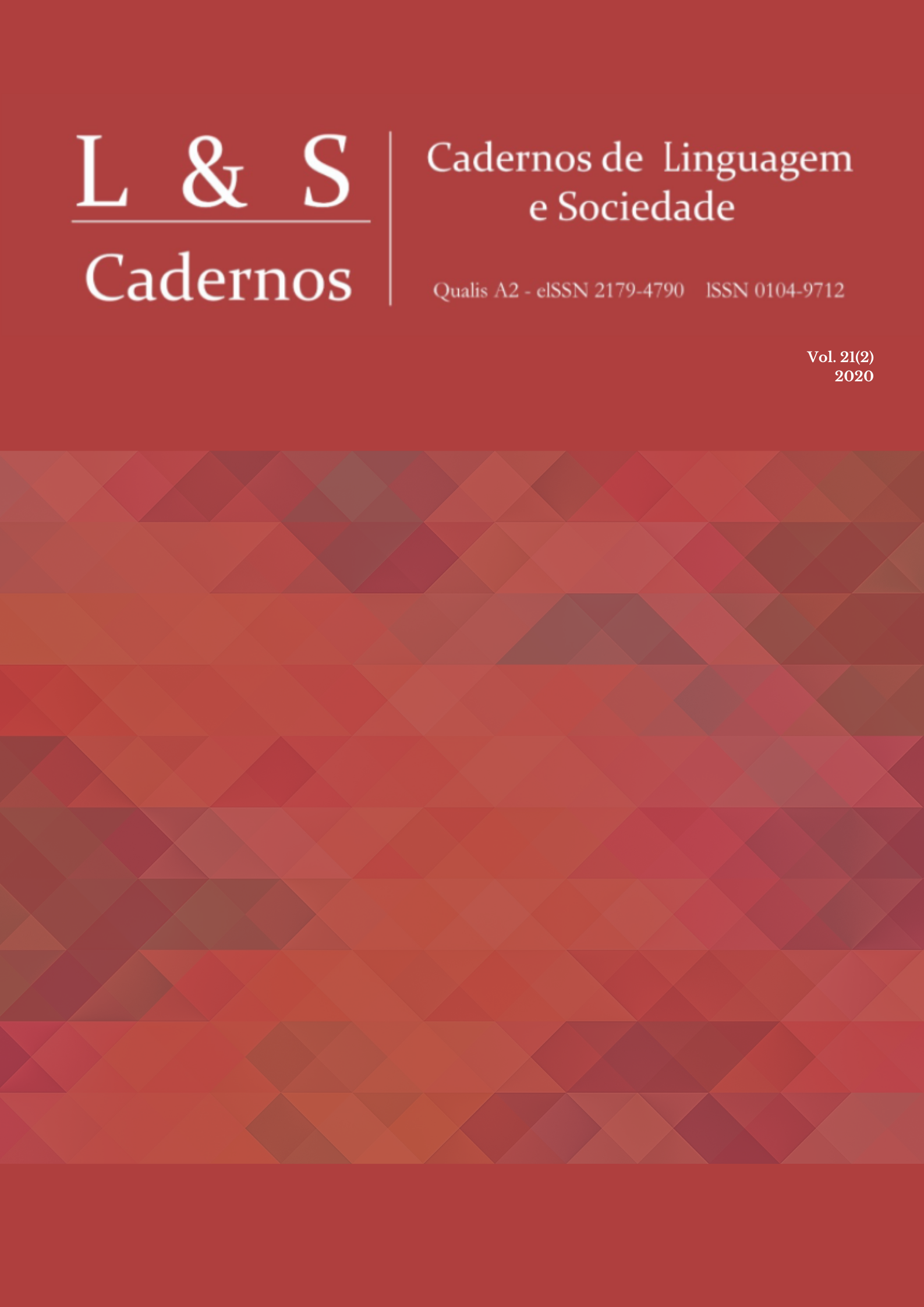Transgaysive speakers: queer linguistics and monstruous performativities
DOI:
https://doi.org/10.26512/les.v21i2.35211Keywords:
Queer Linguistics, Transgaysive Speakers, Indexicality, BodyAbstract
This paper advances the concept of transgaysive speakers which provides analytical possibilities to investigate how people, in their daily practices, negotiate meanings for who they are vis-à -vis norms that circumscribe what they can/should do and how they can/should speak/write, drawing boundaries between the normal/ideal and the abject/monstrous. The paper is grounded on a queer analytical perspective for the study of language-use guided by the concepts of indexicality and embodiment. I revisit data from an ethnographic research about safe sex outreach work among travestis with a view to investigating how transgaysive performances (i.e. stylizations that juxtapose linguistic repertoires and repurpose disciplining regimes of gendered behaviour) emerge and function to achieve local interactional objectives.
Downloads
References
ALMEIDA, A. N. (Re)fazendo a tradição, (des)construindo gênero: aproximações entre análise da conversa e linguística queer. In: BORBA, R. (org.). Discursos transviados: por uma linguística queer. São Paulo:Cortez, 2020. p. 243-280.
BARRETT, R. Seria a teoria queer importante para a teoria sociolinguística? In: BORBA, R. (org.). Discursos transviados: por uma linguística queer. São Paulo: Cortez, 2020. p. 47-65.
BARRETT, R. The emergence of the unmarked: Queer theory, language ideology, and formal linguistics. In: ZIMMAN, L.; DAVIS, J.; RACLAW, J. (ed.). Queer excursions: Retheorizing binaries in language, gender, and sexuality research. Oxford: Oxford University Press, 2014. p. 195-223
BENTO, B. Transviad@s: Gênero, sexualidade e direitos humanos. Salvador: EdUFBA, 2016.
BONFANTE, G. M.; BORBA, R. Distensões e contorções do corpo e do discurso no bareback. In: JESUS, D. M.; CARBONIERI, D.; MELO, G. (org.). Corpos transgressores: homenagem à Dandara dos Santos. São Paulo: Pontes, 2018.
BORBA, R. Linguística queer: algumas desorientações. In: BORBA, R. (org.), Discursos transviados: por uma linguística queer. São Paulo:Cortez, 2020. p. 9-45.
BORBA, R. Linguística queer: uma perspectiva pós-identitária para os estudos da linguagem. Revista Entrelinhas, n. 9, v. 1, p. 91-107, 2006[2015].
BORBA, R. Discurso e (trans)identidades: interação, intersubjetividade e acesso à prevenção de DST/Aids entre travestis. Revista Brasileira de Linguística Aplicada, v. 9, n. 2, p. 441-473, 2009.
BORBA, R. O (Des)Aprendizado de Si: Transexualidades, interação e cuidado em saúde. Rio de Janeiro:Editora Fiocruz, 2016.
BORBA, R. Gendered politics of enmity: language ideologies and social polarization in Brazil. Gender and Language, v. 14, n. 1, p. 423-448, 2019.
BORBA, R; LOPES, A. C. Escrituras de gênero e políticas da différance: imundície verbal e letramentos de intervenção no cotidiano escolar. Linguagem e Ensino, v. 21, p. 241-285, 2018.
BUCHOLTZ, M.; HALL, K. Embodied sociolinguistics. In: COUPLAND, N. (ed.). Sociolinguistics: Theoretical debates. Cambridge:Cambridge University Press, 2016. p. 173-197.
BUCHOLTZ, M.; HALL, K. Theorizing identity in language and sexuality research. Language in Society, v. 33, n. 4, p. 449-515, 2004.
BURRELL, N.; FITZPATRICK, M. A. The psychological really of material conflict. In: DUDLEY, D. (ed.). Intimates in conflict. Hillsdale:Erlbaum, 1989. p. 167-186.
BUTLER, J. Undoing gender. Nova York: Routledge, 2004.
BUTLER, J. Problemas de gênero: feminismo e a subversão da identidade. Rio de Janeiro:Civilização Brasileira, 1990 [2003].
BUTLER, J. Corpos que ainda importam. In: COLLING, L. (org.). Dissidências sexuais e de gênero. Slavador:EdUFBA, p. 19-41, 2016.
CAMERON, D. The myth of Mars and Venus: Do men and women really speak different languages. Oxford:Oxford University Press, 2007.
CHAMBERLAIN, A. Women’s languages. American Anthropologist, v. 14, p. 579-581, 1912.
CHOMSKY, N. Aspects of the theory of syntax. Cambridge, MA:MIT Press, 1965.
DERRIDA, J. Gramatologia. São Paulo:Perspectiva, 1967 [2013].
FABRÃCIO, B. F. Mobility and discourse circulation in the contemporary: the turn of the referential screw. Revista da ANPOLL, Florianópolis, v. 40, n. 1, p. 129-140, 2016.
FABRÃCIO, B. F.; MOITA LOPES, L. P. “A guerra dos carneiros gays”: a (re)construção do fantasma da eugenia sexual no discurso midiático. Matraga, v. 15, p. 64-84, 2008.
HALL, K. Sexualidade intertextual: paródias de classe, identidade e desejo nas fronteiras de Deli. In: BORBA, R. (org.). Discursos transviados: por uma linguística queer. São Paulo:Cortez, 2020. p. 283-215.
HALL, K. Commentary I: “It’s a hijra!” Queer linguistics revisited. Discourse & Society, v. 24, n. 5, p. 634-642, 2013.
HALL, K. Exceptional speakers: contested and problematized gender identities. In. HOLMES, J.; MEYERHOFF, M. (ed.). The handbook of language and gender. Oxford: Blackwell, 2003. p. 353-380
HALPERIN, D. Saint Foucault: towards a gay hagiography. Nova York: Oxford University Press, 1995.
JESPERSEN, O. Language: its nature, development and origins. Londres:Allen and Unwin, 1922.
LAKOFF, R. Language and woman’s place. Nova York:Harper Colophon, 1975.
LEWIS, E. S. Do ‘léxico gay’ Ã Linguística Queer: desestabilizando a norma homossexual oculta nas teorias queer. Estudos Linguísticos, v. 47, n. 3, p. 675-690, 2018.
LIMA, C. H. Linguagens pajubeyras: re(ex)istência cultural e subversão da heteronormatividade. Salvador: Devires, 2017.
LIVIA, A.; HALL, K. (ed.). Queerly Phrased: Language, gender and sexuality. Oxford:Oxford University Press, 1997.
LOPES, A. C.; SILVA, D. “Todos nós semos de frontera”: ideologias linguísticas e a construção de uma pedagogia translíngue. Linguagem em (Dis)curso, Tubarão, v. 18, n. 3, p. 695-713, 2018.
LOURO, G. L. Teoria queer: Uma perspectiva pós-identitária para a Educação. Estudos Feministas, v. 9, n. 2, p. 541-553, 2001.
MELO, I. Características e princípios da linguística queer: carões e lacrações nos estudos da linguagem. In: BORBA, R. (org.), Discursos transviados: por uma linguística queer. São Paulo:Cortez, 2020. p. 155-183.
MISKOLCI, R. Teoria queer: Um aprendizado pelas diferenças. Belo Horizonte:Autêntica, 2015.
MOITA LOPES, L. P. “Falta homem até pra homem”: A construção da masculinidade hegemônica no discurso midiático. In: HEBERLE, V.; OSTERMANN, A. C.; FIGUEIREDO, D. C. (org.). Linguagem e gênero no trabalho, na mídia e em outros contextos. Florianópolis: Editora da UFSC, p. 131-157, 2006.
MOTSCHENBACHER, H. Taking queer linguistics further: sociolinguistics and critical heteronormativity research. International Journal of the Sociology of Language, v. 212, p. 149-179, 2011.
OCHS, E. Indexing gender. In: DURANTI, A.; GOODWIN, C. (ed.). Rethinking context: Language as an interactive phenomenon. Cambridge: Cambridge University Press, 1993. p. 335-358.
PELKEY, J. The semiotics of X: chiasmus, cognition, and extreme body memory. Londres: Bloomsbury, 2017.
PELÚCIO, L. Possible appropriations and necessary provocations for a teoria cu. In: LEWIS, E. S.; BORBA, R.; FABRÃCIO, B. F.; PINTO, D. (ed.). Queering Paradigms IV: South-North dialogues on queer epistemologies, embodiments and activism. Oxford:Peter Lang, 2014. p. 31-52.
PINTO, J. P. Performatividade radical: ato de fala ou ato do corpo? Gênero, v. 3, n. 1, p. 101-110, 2012.
PRECIADO, P. B. Manisfesto contrassexual. São Paulo:N-1 edições, 2014.
SANTOS FILHO, I. I. Linguística queer. Recife:Pipa, 2020.
TANNEN, D. That’s not what I meant: how conversational style makes or breaks relationships. Nova York: Ballantine, 1986.
ZIMMAN, L.; DAVIS, J.; RACLAW, J. Queer excursions: retheorizing binaries in language, gender and sexuality research. Oxford:Oxford University Press, 2014.
Downloads
Published
Issue
Section
License
Copyright (c) 2020 Cadernos de Linguagem e Sociedade do Programa de Pós-Graduação em Linguística da UnB é licenciado sob uma Licença Creative Commons Atribuição-Uso não-comercial-Vedada a criação de obras derivadas 3.0 Unported.

This work is licensed under a Creative Commons Attribution 4.0 International License.



